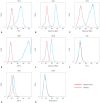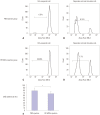Immune Tolerance of Human Dental Pulp-Derived Mesenchymal Stem Cells Mediated by CD4⁺CD25⁺FoxP3⁺ Regulatory T-Cells and Induced by TGF-β1 and IL-10
- PMID: 28792150
- PMCID: PMC5552631
- DOI: 10.3349/ymj.2017.58.5.1031
Immune Tolerance of Human Dental Pulp-Derived Mesenchymal Stem Cells Mediated by CD4⁺CD25⁺FoxP3⁺ Regulatory T-Cells and Induced by TGF-β1 and IL-10
Abstract
Purpose: Most studies on immune tolerance of mesenchymal stem cells (MSCs) have been performed using MSCs derived from bone marrow, cord blood, or adipose tissue. MSCs also exist in the craniofacial area, specifically in teeth. The purpose of this study was to evaluate the mechanisms of immune tolerance of dental pulp-derived MSC (DP-MSC) in vitro and in vivo.
Materials and methods: We isolated DP-MSCs from human dental pulp and co-cultured them with CD4⁺ T-cells. To evaluate the role of cytokines, we blocked TGF-β and IL-10, separately and together, in co-cultured DP-MSCs and CD4⁺ T-cells. We analyzed CD25 and FoxP3 to identify regulatory T-cells (Tregs) by fluorescence-activated cell sorting (FACS) and real-time PCR. We performed alloskin grafts with and without DP-MSC injection in mice. We performed mixed lymphocyte reactions (MLRs) to check immune tolerance.
Results: Co-culture of CD4⁺ T-cells with DP-MSCs increased the number of CD4⁺CD25⁺FoxP3⁺ Tregs (p<0.01). TGF-β or/and IL-10 blocking suppressed Treg induction in co-cultured cells (p<0.05). TGF-β1 mRNA levels were higher in co-cultured DP-MSCs and in co-cultured CD4⁺ T-cells than in the respective monocultured cells. However, IL-10 mRNA levels were not different. There was no difference in alloskin graft survival rate and area between the DP-MSC injection group and the non-injection group. Nonetheless, MLR was reduced in the DP-MSC injected group (p<0.05).
Conclusion: DP-MSCs can modulate immune tolerance by increasing CD4⁺CD25⁺FoxP3⁺ Tregs. TGF-β1 and IL-10 are factors in the immune-tolerance mechanism. Pure DP-MSC therapy may not be an effective treatment for rejection, although it may module immune tolerance in vivo.
Keywords: Dental pulp; immune tolerance; mesenchymal stem cell.
© Copyright: Yonsei University College of Medicine 2017
Conflict of interest statement
The authors have no financial conflicts of interest.
Figures






Similar articles
-
TGF-β1-Licensed Murine MSCs Show Superior Therapeutic Efficacy in Modulating Corneal Allograft Immune Rejection In Vivo.Mol Ther. 2020 Sep 2;28(9):2023-2043. doi: 10.1016/j.ymthe.2020.05.023. Epub 2020 May 30. Mol Ther. 2020. PMID: 32531237 Free PMC article.
-
Transforming growth factor-β-Expressing Mesenchymal Stem Cells Induce Local Tolerance in a Rat Liver Transplantation Model of Acute Rejection.Stem Cells. 2016 Nov;34(11):2681-2692. doi: 10.1002/stem.2437. Epub 2016 Jul 8. Stem Cells. 2016. PMID: 27333806
-
The immunomodulatory effects of human mesenchymal stem cells on peripheral blood mononuclear cells in ALS patients.J Neurochem. 2014 Oct;131(2):206-18. doi: 10.1111/jnc.12814. Epub 2014 Jul 31. J Neurochem. 2014. PMID: 24995608
-
Mesenchymal stromal cells and immunomodulation: A gathering of regulatory immune cells.Cytotherapy. 2016 Feb;18(2):160-71. doi: 10.1016/j.jcyt.2015.10.011. Cytotherapy. 2016. PMID: 26794710 Review.
-
Mesenchymal stromal cells to promote solid organ transplantation tolerance.Curr Opin Organ Transplant. 2013 Feb;18(1):51-8. doi: 10.1097/MOT.0b013e32835c5016. Curr Opin Organ Transplant. 2013. PMID: 23254705 Review.
Cited by
-
The Regulatory Role of T Cell Responses in Cardiac Remodeling Following Myocardial Infarction.Int J Mol Sci. 2020 Jul 16;21(14):5013. doi: 10.3390/ijms21145013. Int J Mol Sci. 2020. PMID: 32708585 Free PMC article. Review.
-
Clinical Potential of Dental Pulp Stem Cells in Pulp Regeneration: Current Endodontic Progress and Future Perspectives.Front Cell Dev Biol. 2022 Apr 11;10:857066. doi: 10.3389/fcell.2022.857066. eCollection 2022. Front Cell Dev Biol. 2022. PMID: 35478967 Free PMC article. Review.
-
Mesenchymal Stem Cells as New Therapeutic Agents for the Treatment of Primary Biliary Cholangitis.Anal Cell Pathol (Amst). 2017;2017:7492836. doi: 10.1155/2017/7492836. Epub 2017 Dec 19. Anal Cell Pathol (Amst). 2017. PMID: 29410945 Free PMC article. Review.
-
Mechanisms underlying dental-derived stem cell-mediated neurorestoration in neurodegenerative disorders.Stem Cell Res Ther. 2018 Sep 26;9(1):245. doi: 10.1186/s13287-018-1005-z. Stem Cell Res Ther. 2018. PMID: 30257724 Free PMC article. Review.
-
The effect of mesenchymal stem cells lyophilisate femoral artery of rat anastomosis: A histopathological and histomorphometric study.Ann Med Surg (Lond). 2021 Sep 25;70:102861. doi: 10.1016/j.amsu.2021.102861. eCollection 2021 Oct. Ann Med Surg (Lond). 2021. PMID: 34691418 Free PMC article.
References
-
- Gronthos S, Brahim J, Li W, Fisher LW, Cherman N, Boyde A, et al. Stem cell properties of human dental pulp stem cells. J Dent Res. 2002;81:531–535. - PubMed
-
- Le Blanc., K Immunomodulatory effects of fetal and adult mesenchymal stem cells. Cytotherapy. 2003;5:485–489. - PubMed
-
- Selmani Z, Naji A, Zidi I, Favier B, Gaiffe E, Obert L, et al. Human leukocyte antigen-G5 secretion by human mesenchymal stem cells is required to suppress T lymphocyte and natural killer function and to induce CD4+CD25highFOXP3+ regulatory T cells. Stem Cells. 2008;26:212–222. - PubMed
MeSH terms
Substances
LinkOut - more resources
Full Text Sources
Other Literature Sources
Research Materials

